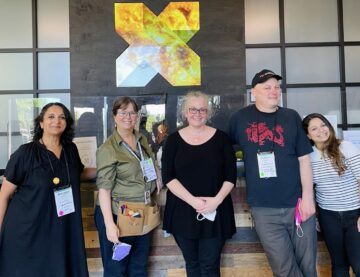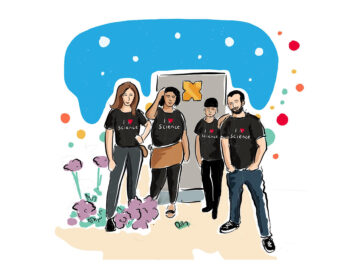Subscribe to our newsletter
Sci Foo 2019 – A weekend of ideas and collaboration
In an unassuming former shopping-mall-turned-industrial-warehouse on the periphery of Mountain View, a small Californian town named for its views of the Santa Cruz Mountains, all manner of activity is currently unfolding.
Lying on the table in front of us lies an actual woolly mammoth tooth, while across the room is a human heart stripped from cells. Meanwhile a huddle of people thoroughly inspects a rat brain model. It’s a scene typical of the many wondrous curiosities on offer at the annual Sci Foo ‘unconference’, an idiosyncratic event that is both lightly structured and informal.
Part of a wider range of events collectively known as Foo Camps, this three-day science themed gathering hosts researchers, writers, educators, artists, policy makers, investors, and other thought-leaders from across the globe. This year is no different, and marks the biggest since its inception in 2006, with more than 350 invited attendees.
Co-organised by Google, O’Reilly Media, and Digital Science, with support from Nature, for a successive year at the secretive ‘X’ (formerly Google X) – home to Google’s self-driving car and other major technological innovations – the event has no predefined agenda. Instead, the ‘unconference’ style means that the attendees create their own weekend schedule of suggested talks on the first night of the meeting.
An apt description of #SciFoo from another conversation today: “it’s like a bunch of nice nerds” 😂🤓 pic.twitter.com/0wWMk0f2cA
— Daniel Kim (@ProfDanielKim) July 14, 2019
Watching the encouraging mayhem ensue as hundreds of leading thinkers in their fields crowd around a board clutching their Post-It scribbled session proposals is both infectious and endearing. It epitomises the willingness and hunger to share and learn from each other, as well as collaborate on ideas at Sci Foo.
As a result, the breadth and diversity of sessions is staggering and fascinating. The session clashes are endless and that’s before you take into account the two one hour-long sessions of lightning talks kicking off both Saturday and Sunday’s events.
I wasn’t going to do a sex robot session at #scifoo but then I did, last minute, and it was lovely and we played Exquisite Corpses and designed new sex robots. Thank you, everyone who came along.
— Kate Devlin (@drkatedevlin) July 14, 2019
Tip for #scifoo attendees:
take a tour of the 3D printing lab downstairs and they'll give you a 3D printed catapult! pic.twitter.com/G6NyjSW7Og— Brian Skinner (@gravity_levity) July 13, 2019
Showing off the power of planetarium software and data at #SciFoo @OpenSpaceProj @AMNH Other astronomers here are welcome to use my laptop in the inflatable planetarium and I can do another session on @ESAGaia stories later tonight or tomorrow! https://t.co/F9yPvwOHK9
— Jackie Faherty (@jfaherty) July 14, 2019
Trying to summarise what goes on in the lively sessions and picking highlights is near impossible. A taster of session subjects among many others includes: ‘the neural basis of consciousness’, ‘fully automated luxury feminism’, ‘climate change – where are we going?’ ‘changing perspectives on Africa with science’, ‘what is the scientific journal of tomorrow?’ ‘social media for social good’, ‘making new materials’, ‘decolonising science – how do we know what we know?’
#scifoo : one of the rare scientific meetings I’ve been to where it is completely on-topic to walk over to a fellow attendee you see knitting and bond over shared needlework practices. #IMissCrochet pic.twitter.com/Uth9Y9YcRT
— Clifford Johnson (@asymptotia) July 16, 2019
Sketches of #scifoo pic.twitter.com/EWh7uTluit
— Alex Cagan (@ATJCagan) July 14, 2019
Attendees are encouraged to take part in sessions completely outside their fields of expertise and are given the freedom to roam between them. This often leads to engaged debates and conversations within a multidisciplinary group of individuals, who may not usually have the opportunity to meet people from outside their own narrow field of research. The Sci Foo ethos is very much aligned with the ‘Pac-Man mentality’ (leave an open ‘wedge’ in a group conversation so others can join in easily), which is noticeable throughout both sessions and while dining in Google’s famed micro-kitchens and canteen.
https://twitter.com/AnaMaHidal/status/1150102943103889413
https://twitter.com/seis_matters/status/1150554956186783744
Favorite #scifoo talk of the morning: @carousopeck on zebra finches, song learning, and high-speed camera video to understand gestures… but with her audio not working, she deftly recovers by performing the bird sounds on the mic for us #presentationgoals
— Ben Fry (@ben_fry) July 14, 2019
The coolest thing I've seen in ages! Portable, handheld, low cost, diy ultrasound. Amazing. #scifoo https://t.co/BtmbsX3tGQ
— Dr. Nina Dudnik (@Nina_Dudnik) July 13, 2019
Dr Amelia A Lake, a reader in public health nutrition at Teeside University, sums up the spirit of SciFoo in a great roundup – ‘Be inclusive, be kind, be curious and talk to people from as many diverse fields as possible.’ While Dr Michelle Rodrigues, a biological anthropologist, brilliantly talks about failure in science and experiencing something different at the event – ‘(Sci Foo) had the peculiar effect of almost eliminating the normal forms of gatekeeping and hierarchy academia has taught me to expect as normal.’ Neuroscientist and photographer Bryan Jones captured some as ever incredible photos and as a research physicist-turned-writer Laurie Winkless concisely put it two years ago in an entertaining roundup – ‘everyone experiences a different Sci Foo, and that is really, really special.’
Sci Foo helps foster collaboration between scientists and thinkers from different disciplines, encourages curiosity and learning, and looks to help establish new and lasting friendships. There was enough evidence on show to suggest it achieved all of these – and long may it continue.
Rocking my #scifoo shirt today! The effects of the meeting still with me. Inspired by attendees’ bold, impactful, creative visions. pic.twitter.com/pSfAlpkKxJ
— Prachee Avasthi (@PracheeAC) July 20, 2019
I had the most amazing time at #scifoo this weekend! I learned SO much and met SO many interesting people. Many thanks to all! The generosity of ideas, insight and collaboration was truly appreciated. Hope that the discussions continue and the friendships evolve! Safe travels! pic.twitter.com/8RcwY9WS0k
— Juleen R. Zierath (@JuleenRZierath) July 14, 2019
Final #scifoo announcement of the conference: “a speaker has left a bottle of lubricant here.”
For once it wasn’t me.— Kate Devlin (@drkatedevlin) July 14, 2019
#Scifoo was amazing. Many conferences promise interdisciplinarity and fun, but wow, this one really delivered both. I loved every session and conversation I had! And much thanks to everyone who came to my session on machine learning interpretability! So many sparks.
— zeynep tufekci (@zeynep) July 14, 2019
Thankful to the organizers and attendees of @#scifoo @#scifoo19 for the most extraordinary meeting of human minds and motives that I've ever attended. I'm excited by the collaborations arising — and friendships nucleated — at SciFoo. More to come. pic.twitter.com/5KSfJ5irl5
— Louis Metzger, PhD (@LouisMetzger_) July 15, 2019
Thank you and bye @catallman @Marsee @cdibona @timoreilly @GoogleX_ @OReillyMedia for having us after a fantastic #scifoo from the @digitalsci gang pic.twitter.com/VgjABHjGa7
— marjmyers (@marjmyers) July 15, 2019



